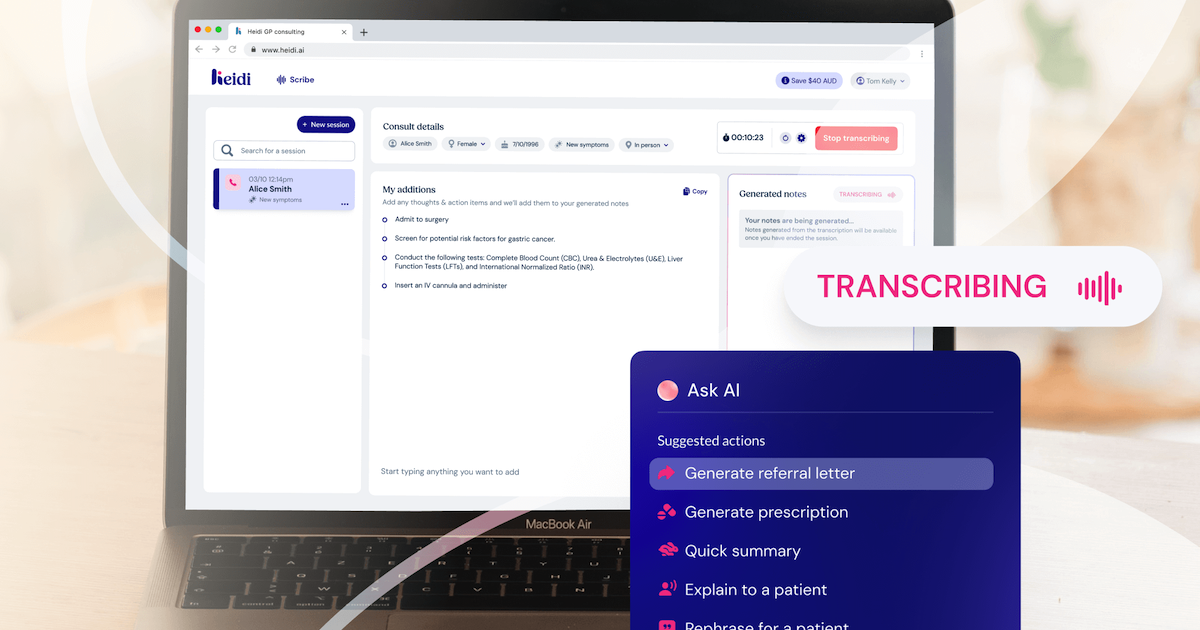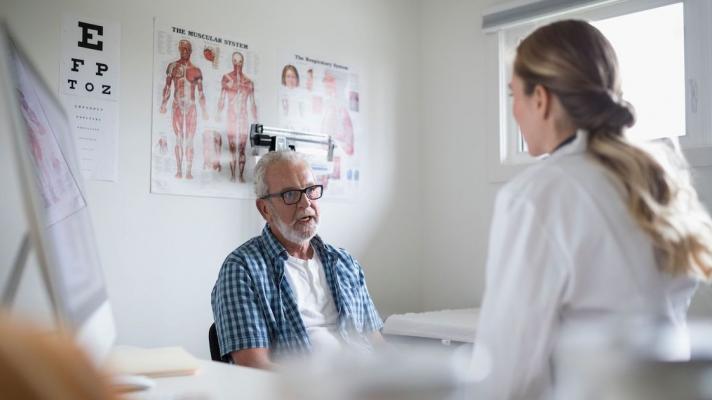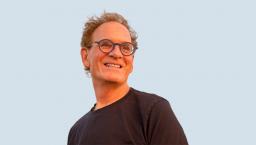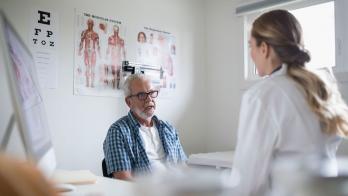
Photo courtesy of Heidi Health
Melbourne-based health tech startup Heidi Health has raised A$10 million ($6.5 million) in a Series A funding round led by Blackbird Ventures.
Hostplus, Hesta, Wormhole Capital, Archangel Ventures, Possible Ventures and Saniel Ventures also participated in this investing round.
This brings its total investments to date to A$15 million ($9.7 million); Blackbird Ventures also led its seed funding round in 2021, which attracted A$5 million ($3 million).
WHAT THEY DO
Formerly Oscer, Heidi was founded just two years ago by a vascular surgery registrar, Dr Thomas Kelly, alongside Waleed Mussa and Yu Liu. They aim to develop AI-powered software that will improve patient experience while enhancing clinicians' working conditions.
Its flagship product, Heidi Clinician, leverages "artificial general intelligence" to automate tedious administrative tasks for clinicians. These include gathering histories, building ward round lists, performing clinical audits, writing clinical notes, creating documents, optimising discharge summaries for billings and processing referrals. Used as either an off-the-shelf or an enterprise white-label solution, Heidi Clinician is now already adopted by 100 GPs in 30 clinics across Australia.
WHAT IT'S FOR
Based on a media release, Heidi will use its fresh funds to develop Heidi Clinician further and to get more clinics and GPs in Australia to use its solution.
The startup directly connects with clinicians to offer their product. It also seeks partnerships with organisations and other software companies to include their AI offering.
"We're all about creating awesome and easy-to-share experiences, especially with multiplayer features that let clinicians share with their colleagues. For big companies, it's about using our already-working healthcare AI system, adding their own data to make Heidi even better, and selling the upgraded version to their existing customers," Dr Thomas Kelly told Mobihealth News, further explaining their go-to-market strategy.
It also plans to use its new funds to expand its team of doctors, designers, and engineers.
WHY IT MATTERS
Australia is facing a shortfall of around 10,600 GPs and a 58% increase in demand for GP services by the end of the decade, according to projections of the Australian Medical Association. It is said that Australian clinicians are now spending up to twice the amount of time on paperwork and administrative tasks than providing essential care and services. This negatively contributes not only to patient outcomes but also to clinician burnout.
"You're overrun with patients and there are never enough hours in the day. My time as a doctor was so often wasted doing paper referrals, waiting on hold or filling in copious amounts of documentation to satisfy the government's requirements for some piece of Medicare funding," Dr Kelly said, sharing her anecdote.
Meanwhile, it was also observed that not many junior doctors are choosing to become GPs, creating a "crippling burden on our GPs."
Heidi is taking a shot at these issues with Heidi Clinician. "[We are using] AI to automate the administrative components of care and better orchestrate our clinician resources with our patient population."
According to Dr Kelly, some GP users of their AI solution are saving between one to two hours of documentation. Several psychologists and occupational therapists have also reported having reduced the time to generate their detailed reports "by a third," down from three weeks to two weeks instead.
"Heidi Clinician is superpower for clinicians, and the first expression of our vision to change the world powered by Heidi's consult data," she emphasised.
MARKET SNAPSHOT
AI, particularly generative AI, easily comes on top of mind of healthcare providers today when considering solutions for raising staff productivity. These tools could bring up to $13 billion in value to the healthcare sector in Australia by 2030, according to Microsoft.
With so many genAI-powered solutions coming into the market lately – including Ubie Medical Navi, Sculpted AI by Pieces Technologies, SayHeart, and AI4Rx's MedBeat HealthConnect, it can be challenging to stay ahead of the pack.
Explaining how they intend to set Heidi apart from its competition, Dr Kelly said: "We're founded by a clinician (me) and have been building in healthcare since 2019. We understand the data, security, privacy, and compliance challenges of using [large language models] in a healthcare setting."
"We believe this is one of the few industries where a sustainable moat can be built at every level of the AI product – in AI safety at the model level, in the application layer with the most amazing product innovations like My Additions that lets you add things that aren't said out loud, and in the [go-to-market] motion creating groundswell around our approach to this space. As with any great idea, there'll be heaps of folks building similar things; we just have to be the best."
ON THE RECORD
"We desperately need a safe path to scale the most scarce resource in our healthcare system — clinicians. Heidi's AI allows clinicians to spend less time on administrative tasks, and more time on what matters most: to foster enduring relationships with their patients and invest in preventative care," commented Michael Tolo, general partner at Blackbird Ventures, who led Heidi's Series A funding round.











def4.jpg)








